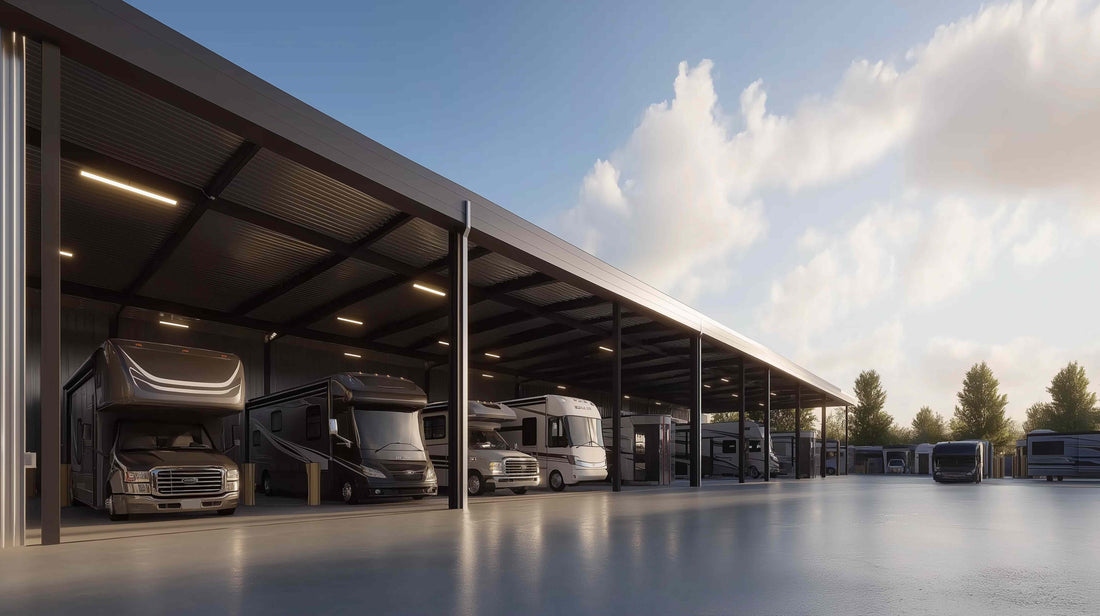
Share
How Much Does It Cost to Store an RV? (Free Calculator)
Storing your RV isn’t just about finding an empty lot to park it. Whether you’re storing it for the winter, between road trips, or year-round, the cost of RV storage can vary widely depending on a few key factors: the size of your RV, the type of storage you choose, the amenities offered, and how long you plan to store it.
This guide will break down everything you need to know about RV storage pricing so you can confidently choose the best option for your vehicle—and your budget.
TL;DR: RV Storage Costs at a Glance
Storing an RV typically costs between $75 and $400+ per month, depending on the size of your rig, the type of storage (outdoor, indoor, climate-controlled), and any amenities you select.
Average Monthly Cost by Storage Type
While rates vary across the country, here are the national averages you can expect for each type of RV storage:
| Storage Type | Monthly Cost Range | Protection Level |
|---|---|---|
| Outdoor (Uncovered) | $75–150 | Minimal (open to elements) |
| Outdoor (Covered) | $125–200 | Moderate (roofed cover) |
| Indoor (Enclosed) | $150–400+ | Full protection |
| Climate-Controlled | Add $25–50 | Regulated temperature & humidity |
Indoor and climate-controlled units offer the most security and protection from the elements—but at a significantly higher price point.
Cost by RV Size (Per-Foot Estimate)
Most facilities charge based on your RV’s length. Here’s a general idea of what you might pay:
| RV Type | Size Range | Outdoor Estimate | Indoor Estimate |
|---|---|---|---|
| Class B Campervan | 16–25 ft | $50–150/month | $100–300/month |
| Travel Trailer | 20–35 ft | $60–210/month | $120–420/month |
| Fifth-Wheel / Class A | 35–45 ft | $105–270/month | $210–540/month |
These are just averages—rates can shift depending on demand, region, and available inventory.
Amenities That Influence Price
Many storage facilities offer add-on features that increase the monthly cost but can significantly improve your experience or protect your RV:
| Amenity | Typical Monthly Cost | Why It Matters |
|---|---|---|
| Electric Hookup | +$10–15 | Keeps batteries charged during long storage |
| 24/7 Access | +$10–25 | Access your RV anytime |
| Dump / Wash Station | +$5–20 | Convenient pre/post-trip maintenance |
| Enhanced Security | +$10–30 | Peace of mind with surveillance & staff |
| Climate Control | +$25–50 | Protects sensitive interiors from moisture |
Choose amenities that match your RV’s value and how frequently you’ll be using or accessing it.
Questions to Ask Before Storing Your RV
Before you commit to a storage facility, ask these essential questions to avoid costly surprises:
Storage Safety & Protection
- What rodent prevention measures are in place? Are there pest control services or physical deterrents?
- Is the facility gated, staffed, or monitored? Get specifics on their security setup.
Access & Conditions
- What are the access hours? Can you retrieve your RV on weekends or holidays?
- What surface is the storage lot? Gravel, paved, or dirt can affect wear and tear.
Insurance & Liability
- Do I need additional insurance? Check with your provider about coverage for stored RVs.
- Is the facility liable for damage or theft? Review the storage agreement carefully.
Additional Services
- Are there extra fees for utilities or access? Know what’s included — and what isn’t.
- Can I perform light maintenance on-site? Some facilities prohibit on-site repairs or cleaning.
Being proactive with these questions can save you time, money, and frustration.
How to Save on RV Storage
If you’re trying to cut costs, here are smart strategies to reduce your monthly storage bill:
- Choose long-term contracts – Many places offer discounts for 3–12 month commitments.
- Store during off-peak months – Demand (and prices) often drop in summer.
- Skip unnecessary amenities – Only pay for what you’ll actually use.
- Ask about discounts – Some facilities offer deals for RV clubs, veterans, or referrals.
- Compare rates outside urban areas – Facilities farther from city centers may offer better pricing.
Frequently Asked Questions
Do I need indoor storage for winter?
If you live in a cold, wet climate and own a high-value RV, indoor storage may be worth the protection. Otherwise, a covered spot with proper winterization may suffice.
Should I choose climate-controlled storage?
Only if your RV interior is especially sensitive to humidity or extreme temperatures — like leather seating, hardwood cabinetry, or electronics.
What size storage unit do I need?
Measure bumper-to-hitch and check your RV’s specs. Add a few feet for clearance if required by the facility.
Is RV storage tax-deductible?
Not usually, unless the RV is used for business. Check with a tax professional.
Can I store my RV in my driveway instead?
Depends on your local zoning laws or HOA. Even if legal, consider security, rodent risk, and insurance coverage.
Final Thoughts
RV storage costs can range from budget-friendly to premium — depending on your needs, your RV, and the storage setup you choose. The most important thing is balancing cost with protection.
Use the calculator below to get an accurate estimate based on your specific situation. And if you’re storing your RV outdoors — especially at home — make sure to protect it from rodents and pests. A physical barrier like the Box-Kat Mouse Barrier can help keep your vehicle pest-free all season long.
Happy storing—and even happier travels.



